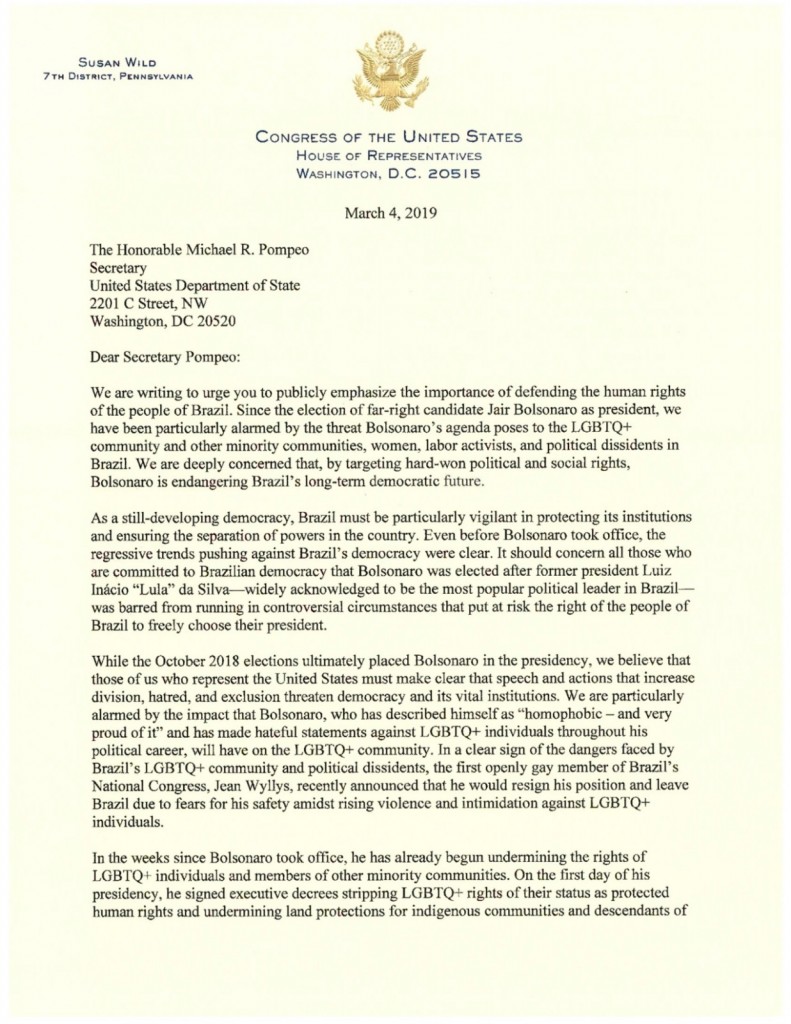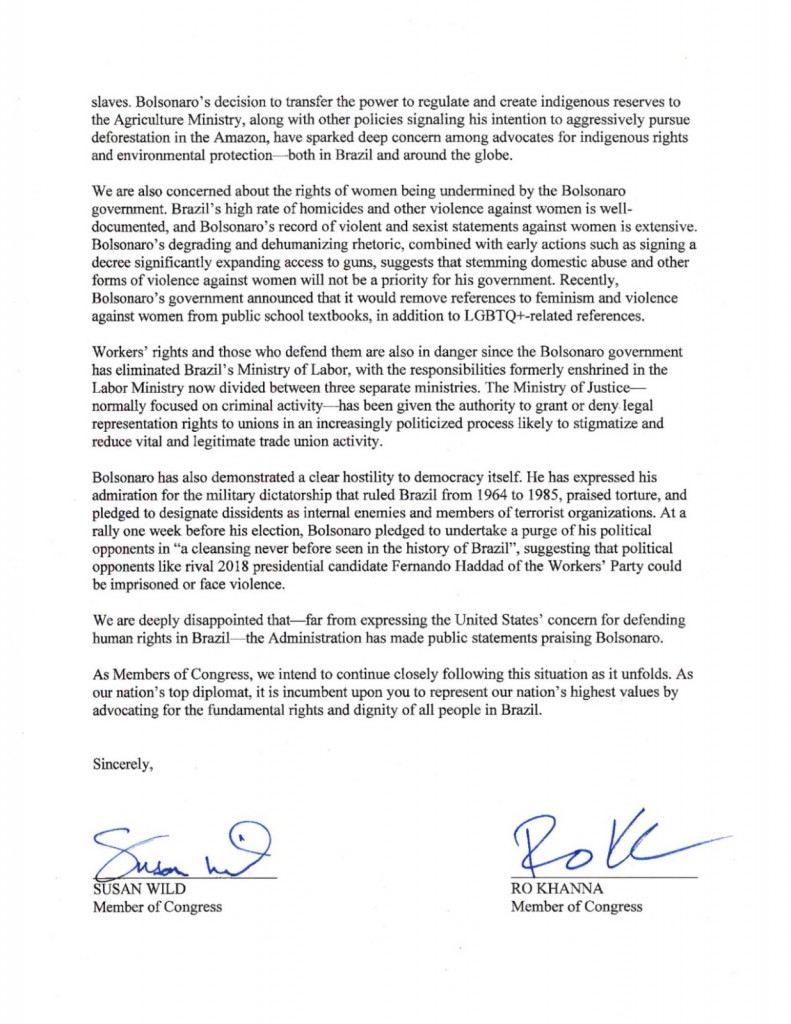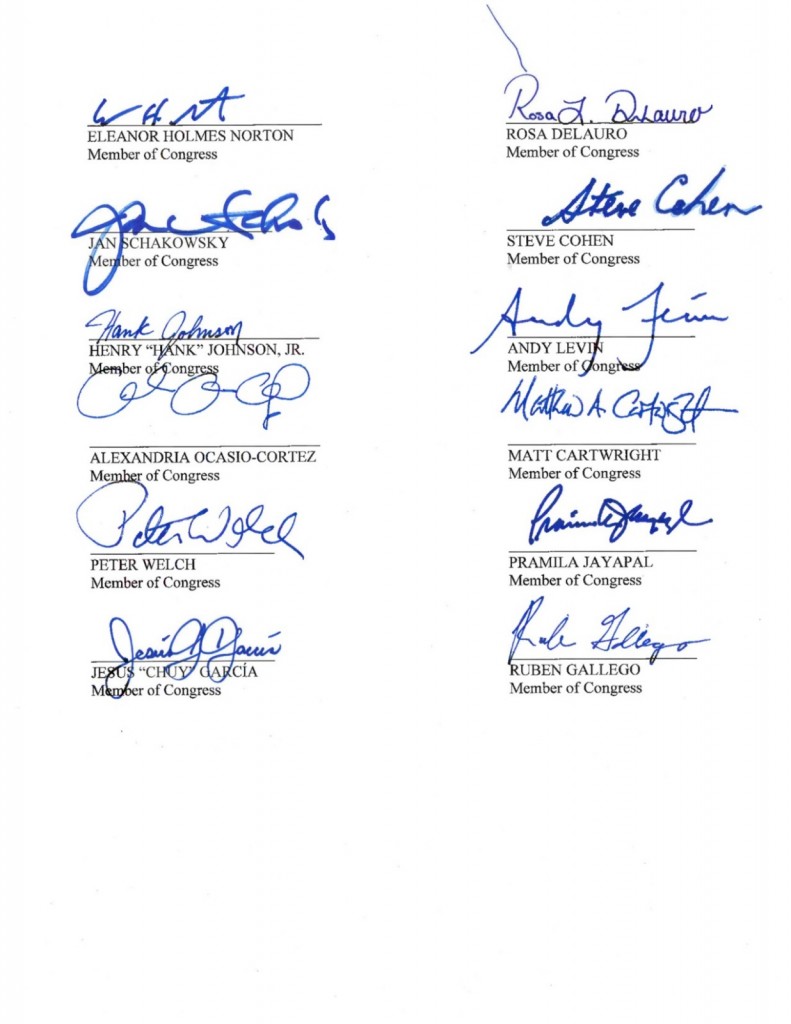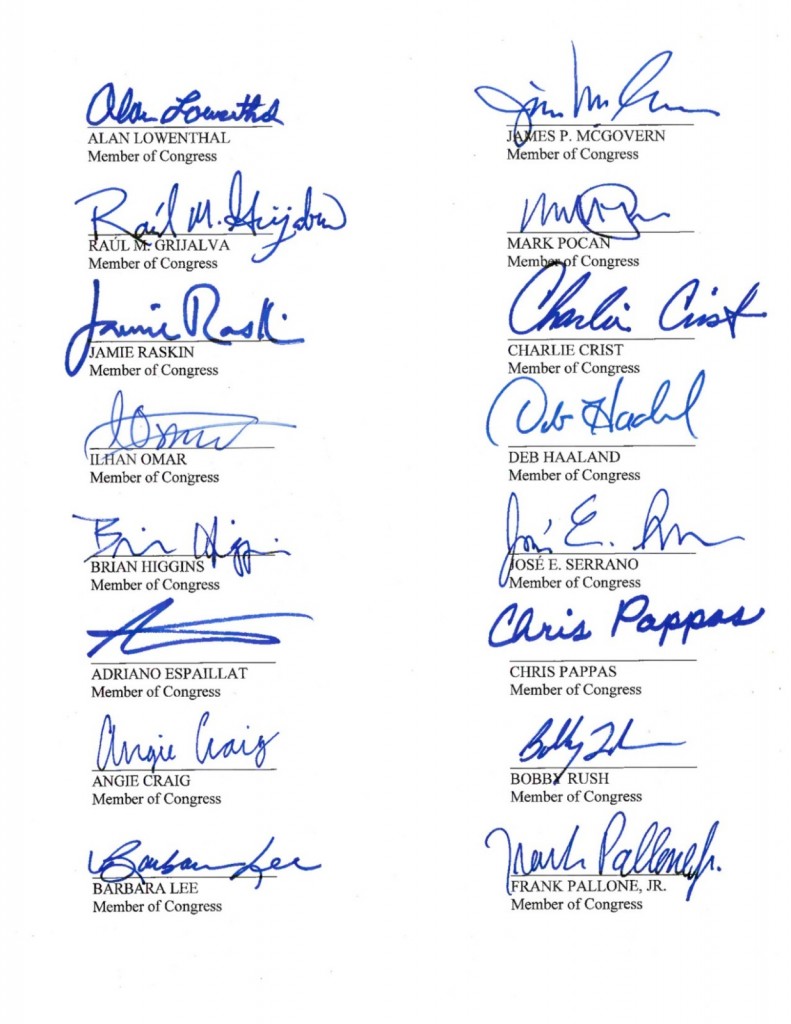“Lula was barred from running in controversial circumstances that put at risk the right of the people of Brazil to freely choose their president.”
On March 5, 30 Democratic US Congressmen sent a letter to Secretary of State Mike Pompeo, expressing their concern about the regressive trends pushing Brazilian democracy and the threats to the LGBTQ+ community, women, indigenous people, Afro-Brazilians and labor union activists caused by right wing extremist President Jair Bolsonaro and his followers. The lawmakers also took a stand on the political imprisonment of former President Lula, saying, “It should concern all those who are committed to Brazilian democracy that Bolsonaro was elected after former president Luiz Inácio “Lula” da Silva—widely acknowledged to be the most popular political leader in Brazil—was barred from running in controversial circumstances that put at risk the right of the people of Brazil to freely choose their president.” The letter was prepared by lawmakers Susan Wild and Ro Khanna and signatories include freshman Congresswomen Alexandria Ocásio Cortez and Ilhan Omar and members of the Progressive Caucus, but – in a sign that the Democratic coalition defending Brazilian democracy is broadening – also include moderate democrats like former Florida Governor, Congressman Charlie Crist. Whereas this is not the first public statement made by democrats expressing concern for human rights in post coup Brazil, it is the first one that has been made since Democrats retook control of the House of Representatives.
The Letter can be read in it’s entirety here:
March 5, 2019
The Honorable Michael R. Pompeo
Secretary
United States Department of State
2201 C Street, NW
Washington, DC 20520
Dear Secretary Pompeo:
We are writing to urge you to publicly emphasize the importance of defending the human rights of the people of Brazil. Since the election of far-right candidate Jair Bolsonaro as president, we have been particularly alarmed by the threat Bolsonaro’s agenda poses to the LGBTQ+ community and other minority communities, women, labor rights activists, and political dissidents in Brazil. We are deeply concerned that, by threatening hard-won political and social rights, Bolsonaro is endangering Brazil’s long-term democratic future.
As a still-developing democracy, Brazil must be particularly vigilant in protecting its institutions, ensuring the separation of powers, and upholding an independent judiciary. Even before Bolsonaro’s rise, the regressive trends pushing against Brazil’s democracy were clear. It should concern all those who are committed to Brazilian democracy that Bolsonaro was elected after former president Luiz Inácio “Lula” da Silva—widely acknowledged to be the most popular political leader in Brazil—was barred from running in controversial circumstances that put at risk the right of the people of Brazil to freely choose their president.
While the October 2018 elections ultimately placed Bolsonaro in the presidency, we believe that those of us who represent the United States must make clear that speech and actions that increase division, hatred and exclusion will never strengthen democracy and its vital institutions. We are particularly alarmed by the impact that Bolsonaro, who has described himself as “homophobic – and very proud of it” and has made hateful statements against LGBTQ+ individuals throughout his political career, will have on the LGBTQ+ community. In a clear sign of the dangers faced by Brazil’s LGBTQ+ community and political dissidents, the first openly gay member of Brazil’s National Congress, Jean Wyllys, recently announced that he would resign his position and leave Brazil due to fears for his safety amidst rising violence and intimidation against LGBTQ+ individuals.
In the weeks since Bolsonaro has been in office, he has already begun undermining the rights of LGBTQ+ individuals and members of other minority communities. On the first day of his presidency, he signed executive decrees stripping LGBTQ+ rights of their status as protected human rights and undermining land protections for indigenous communities and descendants of slaves. Bolsonaro’s decision to transfer the power to regulate and create indigenous reserves to the Agriculture Ministry, along with other policies signaling his intention to aggressively pursue deforestation in the Amazon, have sparked deep concern among advocates for indigenous rights and environmental protection—both in Brazil and around the globe.
We are also concerned about the rights of women being undermined by the Bolsonaro government. Brazil’s high rate of homicides and other violence against women is well-documented, and Bolsonaro’s record of violent and sexist statements against women is extensive. Bolsonaro’s degrading and dehumanizing rhetoric, combined with early actions such as signing a decree significantly expanding access to guns, suggests that stemming domestic abuse and other forms of violence against women will not be a priority for his government. Recently, Bolsonaro’s government announced that it would remove references to feminism and violence against women from public school textbooks, in addition to LGBTQ+-related references.
Workers’ rights and those who defend them are also in danger since the Bolsonaro government has eliminated Brazil’s Ministry of Labor, with the responsibilities formerly enshrined in the Labor Ministry now divided between three separate ministries. The Ministry of Justice—normally focused on criminal activity—has been given the authority to grant or deny legal representation rights to unions in an increasingly politicized process likely to stigmatize and reduce vital and legitimate trade union activity.
Bolsonaro has also demonstrated a clear hostility to democracy itself. He has expressed his admiration for the military dictatorship that ruled Brazil from 1964 to 1985, praised torture, and pledged to designate dissidents as internal enemies and members of terrorist organizations. At a rally one week before his election, Bolsonaro pledged to undertake a purge of his political opponents in “a cleansing never before seen in the history of Brazil”, suggesting that political opponents like rival 2018 presidential candidate Fernando Haddad of the Workers’ Party could be imprisoned or face violence.
We are deeply disappointed that—far from expressing the United States’ concern for defending human rights in Brazil—the Administration has made public statements praising Bolsonaro.
As Members of Congress, we intend to continue closely following this situation as it unfolds. As our nation’s top diplomat, it is incumbent upon you to represent our nation’s highest values by advocating for the fundamental rights and dignity of all people in Brazil.
List of signatories:
Susan Wild, Ro Khanna, Alen Lowenthal, James P. McGovern, Raúl M. Grijalva, Mark Pocan, Jamie Raskin, Charlie Crist, Ilhan Omar, Deb Haaland, Brian Higgins, José Serrano, Adriano Espaillat, Chris Pappas, Angie Craig, Bobby Rush, Barbara Lee, Frank Pallone, Jr., Eleanor Holmes Norton, Rosa Delauro, Jan Schakowsky, Steve Cohen, Henry “Hank” Johnson Jr., Andy Levin, Alexandria Ocasio-Cortez, Matt Cartwright, Peter Welch, Pramila Jayapal, Jesus “Chuy” Garcia, Ruben Gallego
[qpp]





